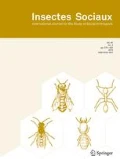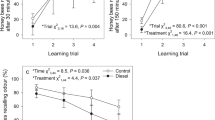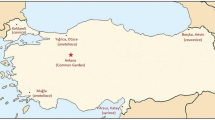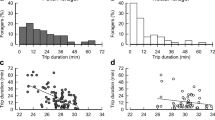Abstract
Cold anaesthesia is commonly used to temporarily immobilise honeybees and other insects for a wide range of experimental investigations. Although cold-narcosis is widely regarded as non-invasive and non-damaging for neural structures, it has been shown that it can influence the bees’ subsequent behaviour in various ways. While we do have some understanding of the effect of cold treatment on handling stress, memory, locomotion and foraging in bees, it remains to be tested whether their defensive behaviour is affected. We investigated the response of foragers to a leg pinch applied before, during or after cold-anaesthesia. As expected, bees pinched at the hive entrance all responded defensively, while anaesthetised bees showed no response. When the pinch was applied after the bees recovered from cold-narcosis, all individuals were defensive, suggesting that previous cooling had not impaired nociception. We then subjected two groups of bees to a continuous pinch, commencing either before or during cold anaesthesia. Interestingly, most of these bees did not show defensive behaviour once awake, even though the clip was still attached to their leg. Chilling only lead to a diminished defensive response if the nociceptive stimulus was continuous rather than momentary, which suggests that it is not the chilling on its own, but the duration of the pinch in combination with cold narcosis that is critical. Our findings highlight the subtle ways in which treatment of insects during narcosis can affect their subsequent behaviour, and point to new ways in which narcosis can interact with sensory perception and adaptation.




Similar content being viewed by others
References
Barron AB (2000) Anaesthetising Drosophila for behavioural studies. J Insect Physiol 46:439–442
Bubak AN, Grace JL, Watt MJ, Renner KJ, Swallow JG (2014) Neurochemistry as a bridge between morphology and behavior: perspectives on aggression in insects. Curr Zool 60(6):778–790
Chen YM, Fu Y, He J, Wang JH (2014) Effects of cold narcosis on memory acquisition, consolidation and retrieval in honeybees (Apis mellifera). Zool Res 35(2):118–123. https://doi.org/10.11813/j.issn.0254-5853.2014.2.118
Erber J (1976) Retrograde amnesia in honeybees (Apis mellifera carnica). J Comp Physiol Psychol 90(1):41–46
Erber J, Mashur T, Menzel R (1980) Localization of short-term memory in the brain of the bee Apis mellifera. Physiol Entomol 5:343–358
Even N (2014) Physiological and behavioural stress responses in the social honeybee, Apis mellifera. PhD thesis, Macquarie University. Chapter 2, Fig. 4
Free JB, Williams IH (1972) Hoarding by honeybees (Apis mellifera L.). Anim Behav 20:327–334
Frost EH, Shutler D, Hillier NK (2011) Effects of cold immobilization and recovery period on honeybee learning, memory, and responsiveness to sucrose. J Insect Physiol 57(10):1385–1390. https://doi.org/10.1016/j.jinsphys.2011.07.001
Galizia CG, Lledo PM (eds) (2013) Neurosciences—from molecule to behavior: a university textbook. Springer Spektrum, Berlin, p 736
Giannoni-Guzman MA, Giray T, Agosto-Rivera JL, Stevison BK, Freeman B, Ricci P, Brown EA, Abramson CI (2014) Ethanol-induced effects on sting extension response and punishment learning in the western honey bee (Apis mellifera). PLoS One 9(7):e100894. https://doi.org/10.1371/journal.pone.0100894
Groening J, Venini D, Srinivasan MV (2017) In search of evidence for the experience of pain in honeybees: a self-administration study. Sci Rep 7:45825. https://doi.org/10.1038/srep45825
Harris JW, Woodring J (1992) Effects of stress, age, season, and source colony on levels of octopamine, dopamine and serotonin in the honey bee (Apis mellifera L.) brain. J Insect Physiol 38(1):29–35
Jack-McCollough RT, Nieh JC (2015) Honeybees tune excitatory and inhibitory recruitment signalling to resource value and predation risk. Anim Behav 110:9–17. https://doi.org/10.1016/j.anbehav.2015.09.003
Lauridsen H, Nielsen MG, Offenberg J (2011) The effect of cooling on mortality of the Asian weaver ant Oecophylla smaragdina. Insect Soc 58:87–90
Lenoir JC, Laloi D, Dechaume-Moncharmont FX, Solignac M, Pham MH (2006) Intra-colonial variation of the sting extension response in the honey bee Apis mellifera. Insect Soc 53(1):80–85. https://doi.org/10.1007/s00040-005-0838-5
MacAlpine JLP, Marshall KE, Sinclair BJ (2011) The effects of CO2 and chronic cold exposure on fecundity of female Drosophila melanogaster. J Insect Physiol 57:35–37
MacMillan HA, Sinclair BJ (2011) Mechanisms underlying insect chill-coma. J Insect Physiol 57(1):12–20. https://doi.org/10.1016/j.jinsphys.2010.10.004
Mardan M, Rinderer TE (1980) Effects of carbon dioxide and cold anaesthesia on the hoarding behaviour of the honeybee. J Apic Res 19(3):149–153
McDonald JH (2014) Handbook of biological statistics, 3rd edn. Sparky House, Baltimore, p 299
National Health and Medical Research Council (2013) Australian code for the care and use of animals for scientific purposes, 8th edn. National Health and Medical Research Council, Canberra, p 92
Nouvian M, Reinhard J, Giurfa M (2016) The defensive response of the honeybee Apis mellifera. J Exp Biol 219:3505–3517. https://doi.org/10.1242/jeb.143016
Nunez J, Almeida L, Balderrama N, Giurfa M (1998) Alarm pheromone induces stress analgesia via an opioid system in the honeybee. Physiol Behav 63(1):75–80
Pankiw T, Page RE Jr (2003) Effect of pheromones, hormones, and handling on sucrose response thresholds of honey bees (Apis mellifera L.). J Comp Physiol A Neuroethol Sens Neural Behav Physiol 189(9):675–684. https://doi.org/10.1007/s00359-003-0442-y
Poissonnier LA, Jackson AL, Tanner CJ (2015) Cold and CO2 narcosis have long-lasting and dissimilar effects on Bombus terrestris. Insect Soc 62:291–298. https://doi.org/10.1007/s00040-015-0404-8
Stabentheiner A, Kovac H, Schmaranzer S (2007) Thermal behaviour of honeybees during aggressive interactions. Ethology 113(10):995–1006. https://doi.org/10.1111/j.1439-0310.2007.01403.x
Tan K, Hu Z, Chen W, Wang Z, Wang Y, Nieh JC (2013) Fearful foragers: honey bees tune colony and individual foraging to multi-predator presence and food quality. PLoS One 8(9):e75841. https://doi.org/10.1371/journal.pone.0075841
Tanner CJ (2009) Chill out: cooling promotes aggressive behavior in the ant Formica xerophila. Insect Soc 56(1):64–69. https://doi.org/10.1007/s00040-008-1039-9
Wilson EE, Howlay D, Nieh JC (2006) Cold anaesthesia decreases foraging recruitment in the New World bumblebee, Bombus occidentalis. J Apic Res 45(4):169–172
Acknowledgements
This study was funded by Australian Research Council Discovery Grant DP 140100914.
Author information
Authors and Affiliations
Corresponding author
Electronic supplementary material
Below is the link to the electronic supplementary material.
Supplementary material 2 (MP4 5820 KB)
Supplementary material 3 (MP4 3176 KB)
Supplementary material 4 (MP4 3892 KB)
Rights and permissions
About this article
Cite this article
Groening, J., Venini, D. & Srinivasan, M.V. Effects of cold anaesthesia on the defensive behaviour of honeybees. Insect. Soc. 65, 359–366 (2018). https://doi.org/10.1007/s00040-018-0620-0
Received:
Revised:
Accepted:
Published:
Issue Date:
DOI: https://doi.org/10.1007/s00040-018-0620-0




